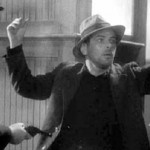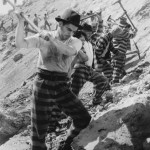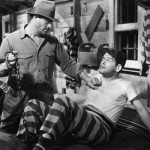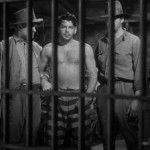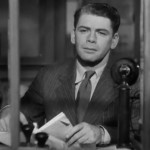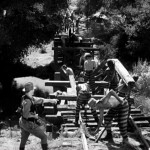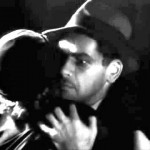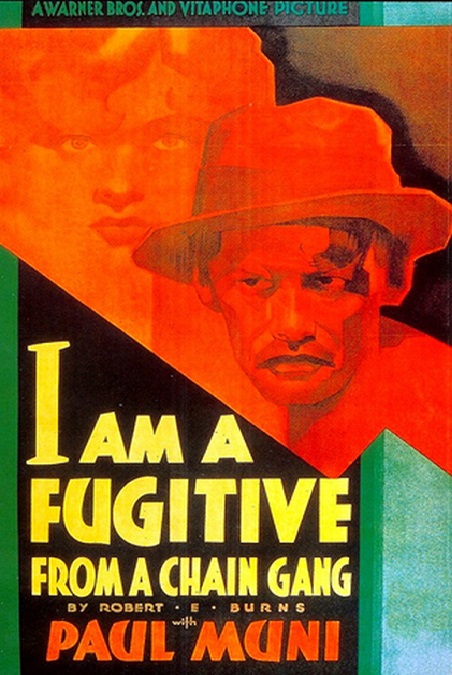
I Am a Fugitive from a Chain Gang – 1932 / 1933
I was really pleasantly surprised by this Best Picture Nominee, though the title was enough to put me on my guard. I mean, I wasn’t terribly interested in a film about a chain gang. But I have to admit that I was focusing too much on the chain gang part, and pretty much ignored the fugitive part. In reality, the later had just as much prominence in the film as the former.
Paul Muni took the lead and he really did a fantastic job. His performance was delivered with a calmness and dignity that belied the horrible circumstances the character was forced to endure. He played the part of James Allen, a man who had aspirations of becoming an engineer, but who could not find work during the depression era. Penniless and homeless, he becomes unwillingly involved in a robbery and a murder. He is wrongfully sentenced to ten years hard labor as part of a chain gang in Georgia.
But he escapes and flees to Chicago. While there, he changes his name and gets a job as a laborer on a construction site. He eventually works his way up to become a prominent engineer and an upstanding member of society, just as he had wanted. But there is a fly in the ointment. He becomes involved with Marie Woods, played by Glenda Farrell. She discovers his secret and blackmails him into a miserable marriage so that she can ride his success and take his money.
When he threatens to leave her, she tells the authorities of his true identity. He tells the media about the true conditions of life as part of a chain gang. In an effort to clear his name and leave his past behind him, he agrees to return to the chain-gang for an agreed upon period of 90 days. But the Georgia authorities lied and failed to release him as promised.
I remember thinking that he needed to get the 90 day sentence in writing. But being a trusting man by nature, Allen did not. And really, that was what got him in trouble in the first place. The Georgia Police refused to release him, so he had to escape again. But this time he could not risk establishing another public life.
He visits his girl, Helen, played by Helen Vinson, with whom he is in love, to say his final good-bye before disappearing into the shadows forever. She desperately tries to get him to stay, asking him, “How do you live?” James, unseen in the darkness, replies, “I steal.” This made for a rather profound and almost horrifying ending. Allen’s will to be free was not broken, but his ability to live an honest life, free from his past was destroyed. Happiness could never be his.
The pacing of the plot was actually very well done. There were plenty of times when it was slow enough to create a story that was meaningful and well told. But there was also plenty of action to keep the interest and excitement going. There was dramatic tension in the parts leading up to the two escapes. The two women each did a fine job, but the real star was Muni. He was great as both the beaten criminal and the honest engineer.
But there was one member of the cast who, from his first appearance on the screen, got on my nerves and made my skin crawl. It was the character of Reverend Robert Allen, James’ brother, played by Hale Hamilton. This guy seemed to be trying too hard to be a good actor, and the result was an overdone performance. He consistently over-pronounced his words and never stopped smiling. He came across as manipulative, controlling, and ultimately creepy.
It is interesting to note that this film actually had a bit of a cultural impact. It made audiences begin to question the legitimacy of the United States Legal System. In January of 1933, the film’s protagonist, Robert Elliot Burns, who was still imprisoned in New Jersey, and a number of other chain gang prisoners nationwide in the United States were able to appeal and were released.
And finally, I have to mention that was up against 9 other films, including that year’s winner, Cavalcade. Honestly, if it were up to me, this would have given Cavalcade a run for its money. I thought it was a better film!
